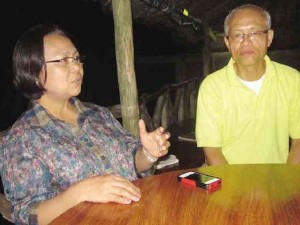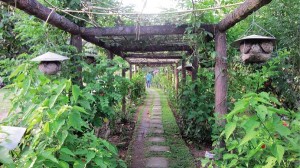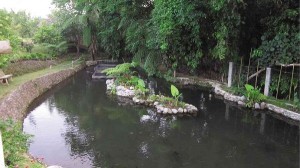The ambience is truly refreshing, blooming with trees, flowers and plants. And it is windy and cool at night, even during summer; you may need a blanket.
There’s a fishpond brimming with tilapia and shrimps; fruit-bearing trees, bees safely hidden (it is a bee farm, after all); wild honey, culinary herbs, stevia plants, passion fruits, mangosteen, cinnamon, coffee and coconut trees; petroleum nuts; and other products and byproducts that will delight any person with a green thumb.
This is balmy Balay Buhay, a nature resort safely tucked away in the foothills of Mt. Bulusan (with its famous legendary lake) in Bulusan, Sorsogon (call Sorsogon City Tourism Office 0917-5033460).
The resort is owned by Zosimo and Luz Gamba, who have a thriving business in Metro Manila and who first envisioned that this place would be their rest house, promising tranquility and a respite from urban worries.
The Gambas bought the 2.5-hectare lot “little by little” in 2002, as they were keen gardeners, and, after attending a seminar, began to develop the place. Soon Balay Buhay just grew and grew, trees sprouted and flowers bloomed all around, the chirping of birds could be heard and yellow butterflies could be seen every morning.
Word began to spread in civil society and government circles, although this was one nature resort which did not advertise (unlike the others en route to Bulusan Lake); there was not even an arrow pointing to its direction and the Sorsogon City Tourism driver had to ask the locals for Balay’s location.
“We choose our clients,” said Luz Gamba. Meaning, “those who behave, the referrals. We want this to be an agricultural resort, so it’s agritourism,”
The resort now has three huts for those who are staying overnight and perhaps for a longer stay, and a big, multipurpose main hut (P1,500 per night). A function room was under construction when we visited the place.
Overnight tents may be pitched at P50 per.
There is no TV here, no radio, no beer and no soft drinks. Instead, you will be served a more healthy concoction, like pandan lemon grass. Cell phone signals are spotty.
“We serve indigenous, organic foods,” Luz says. Meals cost P150 per head.
To help make ends meet, the Gambas produce products and byproducts, and place them on the market: Honey sells at P450 per kilo, pollen and propolis at P800 per kilo, and so on.
The clientele, as indicated earlier, is select and may include priests and nuns on retreat, doctors attending a seminar, students and educators.
Once, some school officials proposed sending 300 high school and college students for an educational tour, and Luz was appalled. No, no, she says, I can only accommodate 100 students. And even then the staff had their hands full. “Ang gulo-gulo nila, (they were so boisterous),” Luz complains goodnaturedly.




